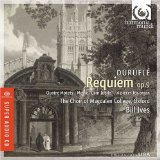Maurice Duruflé’s Requiem is the Pelléas et Mélisande of its genre. Like Debussy’s opera, this music exists in a kind of otherworld, removed from standard form and transcending the usual bonds of melodic structure and harmonic movement. The irregular phrasing and modal, largely scalewise melodies characteristic of the plainchant on which the work is based, are ideal vehicles for creating a kind of rhythmic and harmonic ambiguity that certainly owes something to Debussy but would never be confused with his music. This recording, which uses Duruflé’s 1961 version for choir, small orchestra, and organ, is authoritatively and affectingly sung, with some super solo work in the Pie Jesu from countertenor Magid El-Bushra, exquisite tenor sound and singing throughout, and sublime trebles, especially at the opening of the In Paradisum. And the appropriate atmosphere–contemplation, exaltation, prayer, and reassurance–is enhanced by the perfect balance of all the performing forces (not an easy task!) in a spacious, vibrant acoustic. It all adds up to one of the best Duruflé Requiems on disc.
The four motets are slightly less successful, especially the Ubi caritas, presented a bit too squarely, taking the “plain” in plainchant too literally, missing expressive opportunity in the phrasing. But again, these are sung with lovely choral tone and balance and well-executed ensemble–not shabby at all, just not quite as compelling as performances by the Corydon Singers (Hyperion) or Trinity College, Cambridge (Conifer). Similarly, the Messe “Cum jubilo”, sung here by 13 baritone voices, features first-rate ensemble singing, much of it quite impressive in its power, and, but for a few strained upper-register notes in the Gloria-movement solo, it too is a top choice for this work. The four works for solo organ, in exemplary performances by Martin Ford (Prélude sur l’Introit de l’Épiphanie; Fugue on a theme by Henri Rabaud; Chant donné en hommage à Jean Gallon; Méditation pour orgue), complement the choral selections nicely and further distinguish this program from several other recommendable recordings with otherwise identical repertoire. Highly recommended! [10/20/2008]
































